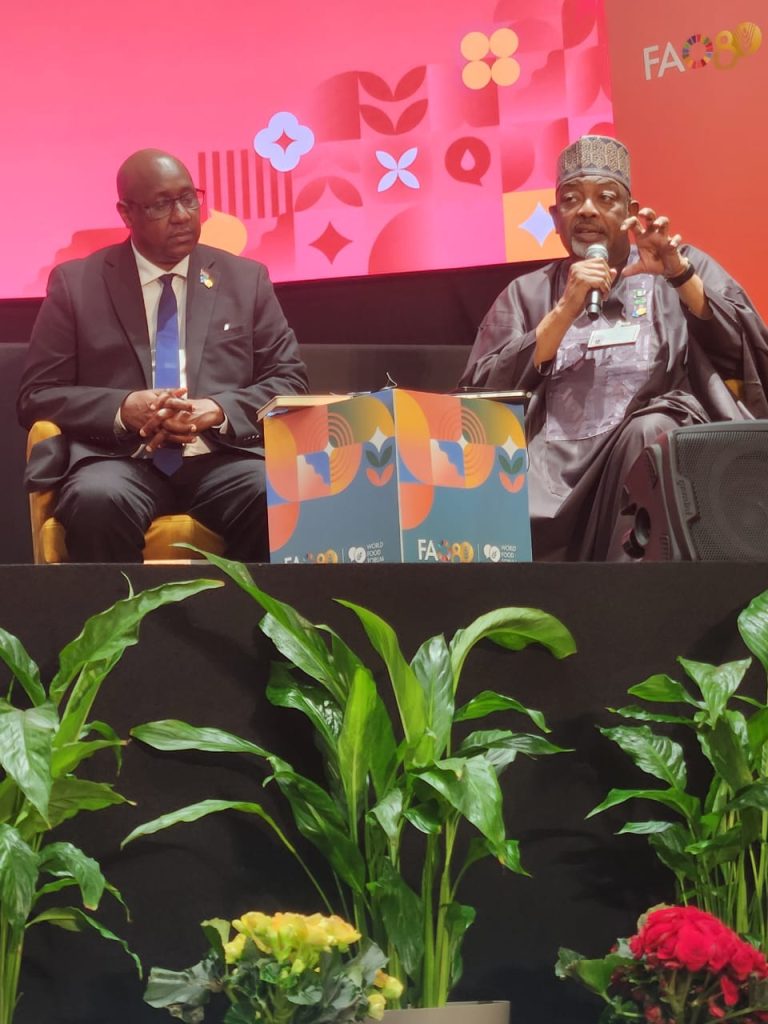The best way to achieve food security and better practice in agriculture is to involve the private sector in agriculture programmes and transformation efforts. This was the submission of the Nigerian delegation during a forum at the recent World Food conference in Italy.
The Minister of Agriculture and Food Security, Sen. Abubakar Kyari, who led the delegation, said, on Tuesday, that strategic and robust Public-Private Collaboration would drive increased production and innovation, as well as create an enabling environment, and better-quality investments in agrifood systems across the Sahel region.
The Minister was speaking during a high-level Panel Discussion at the FAO Hand-in-Hand Sahel Regional Initiative with focus on accelerating capacity, partnerships, and investments to transform agrifood systems in the region, at the event held in Rome, Italy.
Kyari stressed the need for a Sahel region that would leverage strong institutions, innovative financing, strategic and robust public – private collaboration and smart governance to unlock the full potential of farmers, processors, small businesses and revolutionize the agricultural ecosystem.
He outlined the key reforms and programmes designed to enhance private sector participation which includes; the National Agrifood System Investment Plan (NASIP): which is being upgraded into a National Public–Private Investment Portal; a transparent digital platform showcasing bankable opportunities in mechanization. According to him, this will address issues like irrigation, storage, processing, logistics, and digital agrifood services. The initiative, as he said, will involve streamlining incentives like targeted investment tax and import duty reliefs to attract private sector participation, alongside risk-sharing facilities in collaboration with development partners. Added to that is the scaling up of the Special Agro-Industrial Processing Zones (SAPZ), the largest of such initiative in Africa, currently being expanded from eight to twenty-seven states to provide integrated infrastructure and reduce costs for agro-processors and Implementing the Nigeria Postharvest Systems Transformation Programme (NiPHaST): aimed at reducing the ₦3.5 trillion lost annually to post harvest inefficiencies through improved storage, cold chain, and warehousing solutions.
The Minister pointed out that ‘’ the pathway to up-scale is to implement laudable agenda. Implementation is not an abstract. It requires due diligence, smart governance, and unwavering political will’’.
Kyari affirmed that his ministry will be committed “to hard, practical work of aligning policy with possibility; of turning investment promises into concrete projects that create jobs, feed families, and empower communities; of ensuring that the Hand-in-Hand Initiative delivers measurable, lasting transformation for Nigeria’s agrifood systems’’.
He assured that ‘’under the leadership of President Bola Ahmed Tinubu, GCFR, Nigeria is committed to creating an enabling environment where investors can thrive alongside farmers’’.
He pledged that “We will work hand in hand with FAO, IFAD, AfDB, the World Bank Group, ECOWAS, and the private sector to turn investment promises into concrete projects that feed families, create jobs, and strengthen food sovereignty”.

